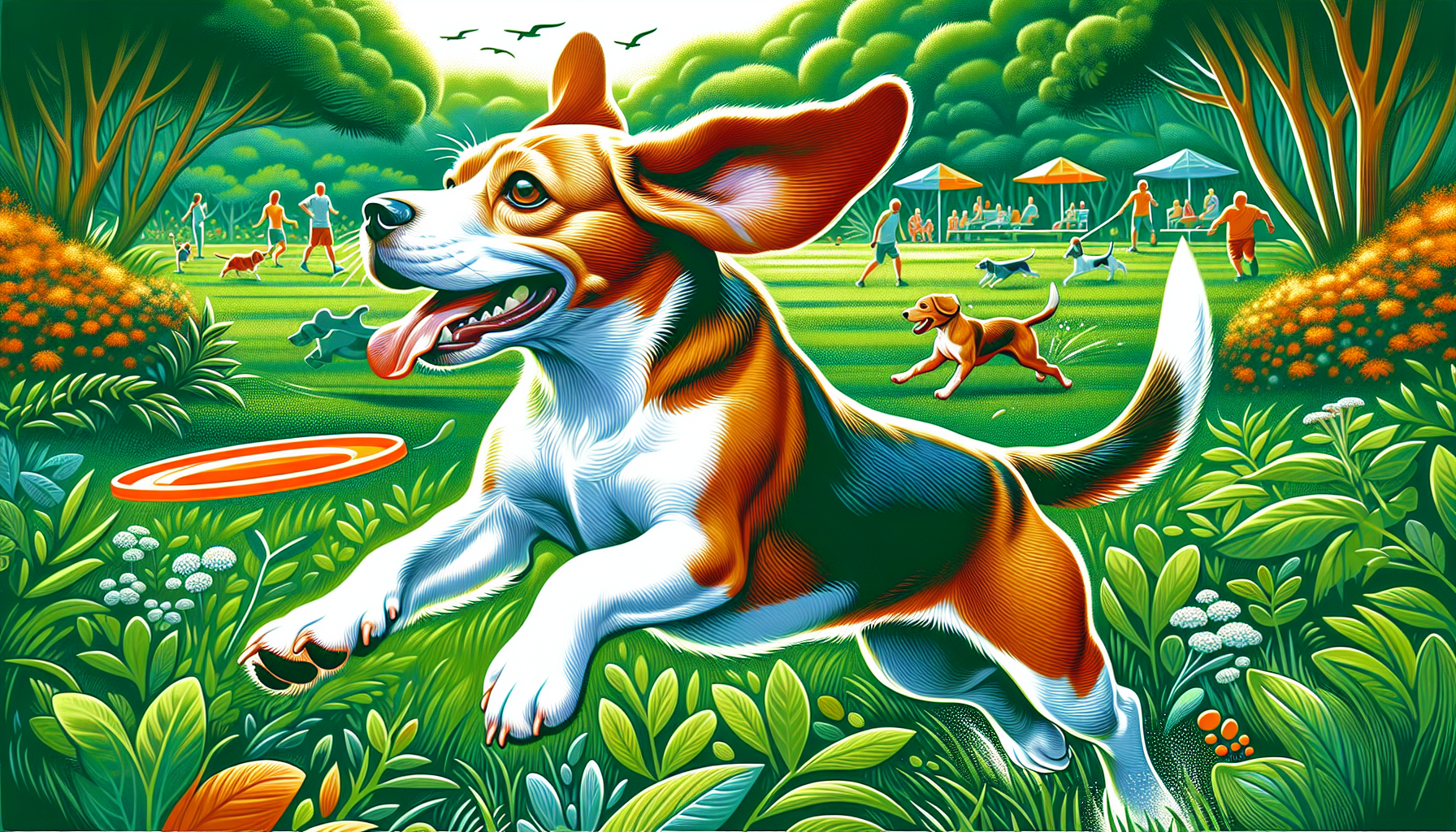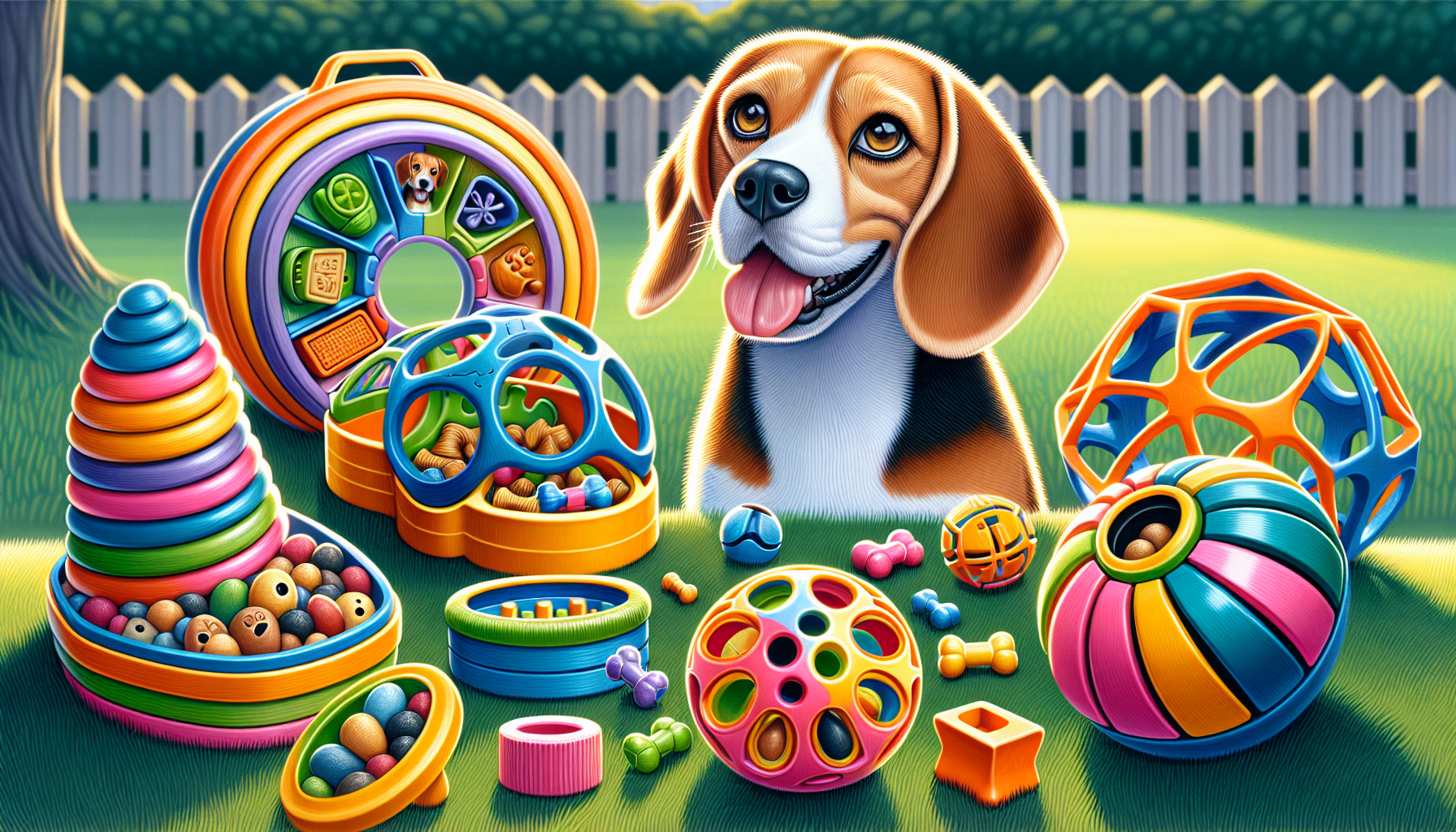Welcome to our comprehensive guide on caring for a Beagle, where we will provide you with clear, concise, and breed-specific care tips to ensure your Beagle thrives for as long as possible. From optimal feeding strategies to essential training routines and health maintenance, we cover all you need to know to raise and care for a happy, healthy Beagle. Let's dive in and get that tail wagging!
Key Takeaways
- Beagles have an appetite for adventure and social interaction, requiring a diet rich in protein, vegetables, and fiber while avoiding food allergies and maintaining healthy weight through careful portion control.
- Adequate mental and physical stimulation are key for beagles. Engaging in activities such as scent games, interactive toys, and daily exercise can help keep their energetic minds and bodies satisfied.
- Ongoing health care for Beagles includes grooming that entails regular brushing and occasional baths, ear and dental care, as well as monitoring for breed-specific health issues like hypothyroidism and obesity.
Find out how to train your beagle to be the well-behaved pup you desire – Read Free Report
Beagle Basics: Understanding Your New Companion
Beagles are a joy to behold, with origins tracing back to Great Britain during the 1830s. Their lineage includes an impressive mix of the Talbot Hound, North Country Beagle, Southern Hound, and potentially the Harrier. Initially bred for hunting hare due to their exceptional olfactory abilities, these little scent hounds have been a part of popular culture since Elizabethan times.
While their short-haired, hard coat can vary in colors, including tricolor, white with tan or lemon, it’s their tail often tipped with white that serves as a visual aid when they are engaged in scent-tracking. Beagles are celebrated for their even-tempered and gentle disposition, complemented by a high sociability that makes them enjoy companionship without being aggressive or timid. This breed exhibits a strong hunting instinct and enthusiastic demeanor, constantly seeking activities, and doing so while typically maintaining minimal inherited health issues.
Nutritional Needs for Beagles
Diet is a critical factor in a Beagle's health. The ideal diet for a Beagle should include:
- High-Quality Dog Food: Opt for dry kibble or wet food specifically formulated for small breeds. Look for products where meat and vegetables are primary ingredients.
- Balanced Ingredients: Ensure the food includes essential fatty acids, vegetables, fruits, and complex carbohydrates to support overall health.
- Appropriate Nutrients: The food should have a balance of nutrients tailored to meet the specific needs of Beagles.
- Adequate Fiber: Include sufficient fiber to aid in digestion and overall gut health.
Given Beagles' propensity for food allergies and sensitivities, a carefully chosen diet is vital to maintain their vitality and coat health while providing all the necessary nutrients. Additionally, it’s crucial to adjust the food intake based on their age and size. Treats should be limited to no more than 10% of their daily caloric intake to avoid excess weight gain, ensuring they remain slim and healthy.
Choosing the Right Food
Selecting the appropriate food for your Beagle is crucial but doesn't have to be overwhelming. To ensure their health and well-being, steer clear of meat by-products and cereal grains like corn or wheat, which can be problematic for some dogs. Instead, prioritize dog foods that contain high-quality ingredients and natural preservatives such as Vitamin E or Vitamin C, avoiding chemical preservatives whenever possible.
It's vital to choose a high-quality dog food that is specifically formulated for small breeds, as these products are designed to meet the unique dietary needs of Beagles. This approach ensures that your Beagle receives all the essential nutrients required to maintain their health and vitality.
Home-Cooked Meals and Supplements
Home-cooked meals can be a beneficial addition to your Beagle’s diet, allowing for customization to their specific tastes and dietary needs with fresh, wholesome ingredients. However, it's important to note that home-cooked meals might not always provide all the essential nutrients your Beagle requires.
To ensure these meals are nutritionally complete, consider incorporating food toppers or supplements as needed. By carefully choosing the right supplements or toppers, you can enhance the nutritional value of home-cooked meals, ensuring they contribute positively to your Beagle’s overall health and well-being.
Obedience Training for Beagles
Beagles are renowned for their exceptional sense of smell, a trait that can often lead them to become easily distracted. This characteristic makes obedience training crucial for controlling their natural instincts to follow scents and hunt. Effective training of Beagles should primarily employ positive reinforcement strategies, utilizing food rewards and verbal cues to encourage desired behaviors. This method requires consistent application and precise timing of rewards to be effective.
To effectively teach obedience, Beagles should learn basic commands through a consistent and firm training approach. Essential commands to teach include:
- ‘Sit’
- ‘Stay’
- ‘Come’
- ‘Down’
Mastering these commands can help mitigate undesirable behaviors, such as jumping on tables, and contribute to raising a well-behaved, content Beagle.
Online Dog Training Programs
Enhancing your Beagle's obedience training can be effectively supported by online dog training programs, such as ‘Brain Training For Dogs‘. These programs offer structured sessions that focus on teaching basic commands and improving concentration through positive reinforcement techniques. This approach not only makes the training process smoother but also more enjoyable for both you and your Beagle. Utilizing these online resources can provide additional support to ensure your training efforts are successful and rewarding.
Exercise and Mental Stimulation

Image created using AI
Beagles are energetic dogs that require 1 to 2 hours of exercise per day to meet their energy levels. Suitable exercises include:
- running
- playing fetch
- going for hikes
- various forms of cardio like chasing a ball
These activities not only keep your Beagle physically fit but also help maintain their mental health, making them great family pets and perfect for a visit to the dog park.
Mental stimulation is equally essential for Beagles. This can be fulfilled through activities such as:
- Scent games, which engage their inherent scent-tracking abilities
- Puzzle toys that challenge their problem-solving skills
- maintain their mental health
Regular walks of at least 20 to 30 minutes at a brisk pace are also beneficial, with two walks per day being ideal for Beagles.
Keeping Your Beagle Active
How do you keep your Beagle active and engaged? Running, playing fetch, and hiking are recommended activities that are perfect for this active breed. However, remember that Beagle puppies should have limited exercise to prevent stress on their developing skeletal system. Once they reach 18 months of age, they are capable of more frequent and intense physical activities.
If you want to add some fun to your Beagle’s exercise routine, consider teaching agility moves through a homemade obstacle course or playing Frisbee, starting with a ‘baby’ Frisbee when they are puppies. This not only provides physical exercise but also stimulates their mind, keeping them happy and active!
Interactive Play and Toys

Image created using AI
Interactive play and toys are a great way to provide mental stimulation to your Beagle. Chewable puzzle toys that hold food can give Beagles the opportunity to satisfy their chewing needs while also engaging their minds. Hide and seek with treats leverages a Beagle’s strong scent-tracking ability, providing mental exercise as they search for their rewards.
Remember, mental stimulation is crucial in keeping Beagles from becoming bored and satisfies their innate curiosity. Here are some ways to provide mental stimulation for your Beagle:
- Hide-and-Seek: Hide food around your home to create a fun and challenging mental exercise as your Beagle hunts for their snacks.
- Interactive Toys and Puzzles: Invest in toys that challenge their problem-solving skills and keep them engaged.
- Training Exercises: Regularly incorporate training exercises into their daily routine to keep their minds active and sharp.
These activities, which can be found at your local pet store, will help keep your Beagle’s active mind occupied and prevent boredom.
Grooming Essentials for Beagles
Keeping your Beagle well-groomed is key to their health and happiness. With their double coats, Beagles are moderate shedders, so regular brushing is essential to keep their fur in top condition and your home free of excess hair. Don't forget about ear care; routine checks and gentle cleanings will help prevent infections. Regular nail trims are also crucial to avoid discomfort and maintain good paw health. By staying on top of these grooming tasks, you'll not only keep your Beagle looking sharp but also ensure they're always feeling their best.
Brushing and Bathing
Maintaining a regular grooming routine is crucial for keeping your Beagle's coat clean and healthy. Here are some effective tips:
- Regular Brushing: Brush your Beagle's coat frequently to eliminate loose fur and prevent matting.
- Occasional Bathing: Bathe your Beagle with a mild dog shampoo as needed to preserve the natural oils in their skin, ensuring not to bathe too frequently as this can strip essential oils.
- Appropriate Tools: Always use a dog-specific brush or comb to avoid irritating their skin.
By adhering to these grooming practices, you'll help ensure your Beagle’s coat remains in excellent condition and their skin healthy. Remember, a consistent grooming routine not only keeps your Beagle looking great but also supports their overall well-being. Turn brushing and bath time into enjoyable regular activities to strengthen your bond and keep your Beagle happy and comfortable.
Ear, Nail, and Paw Care
Beagle’s ears require special attention. They should be checked regularly and cleaned as needed with a mild ear-cleaning solution and a cotton ball to prevent ear infections and discomfort. Be aware that environmental and food allergies can lead to excessive scratching and are a common cause for ear infections in Beagles, making the care of beagle’s ears even more important.
Nail trimming is crucial to prevent discomfort and injury from overgrown nails. Beagles’ nails should be trimmed every 5-6 weeks to prevent issues such as ingrown nails. Don’t forget about paw care! Applying quality paw wax helps maintain paw health by protecting Beagle’s paws from environmental damage and healing dry issues.
Dental Care
Maintaining your Beagle's dental health is crucial but often neglected. Regular brushing of your Beagle’s teeth at least twice a week with dog-specific toothpaste and a 3-sided toothbrush is essential to prevent tartar buildup and periodontal disease. Integrating dental care into your Beagle's routine grooming schedule will not only help maintain their overall health but also keep their smile bright and pain-free. Make dental hygiene a regular part of your care routine to ensure your Beagle's mouth stays healthy.
Common Health Concerns in Beagles
Beagles are generally hardy but are prone to several breed-specific and common health issues. Effective management and regular veterinary check-ups are crucial:
- Hypothyroidism: A condition affecting the thyroid gland, leading to various metabolic issues.
- Limber Tail Syndrome: Characterized by a limp tail, typically following overexertion.
- Obesity: Can lead to further complications like joint stress and cardiovascular issues.
- Dental Issues: Including tartar build-up and periodontal disease which can affect overall health.
- Hip Dysplasia: A genetic condition that causes pain and lameness in the hips, potentially leading to arthritis.
To reduce the risk of these problems, consider the following:
- Choose a reputable breeder: Ensure you obtain a Beagle from a breeder who can provide comprehensive health histories of the puppy's parents and grandparents.
- Regular veterinary visits: Maintain a schedule of regular check-ups to catch and manage health issues early.
Implementing these practices can help maintain the health and enhance the life quality of your Beagle.
Managing Obesity
Preventing obesity in Beagles is crucial for their health and involves providing a well-balanced diet and controlling portion sizes to prevent overeating. Feeding measured meals at regular intervals is essential to manage weight effectively. Additionally, ensuring that Beagles receive adequate daily exercise is vital, as it not only keeps them physically fit but also supports their mental health. Combining diet control with regular exercise is key to effectively managing obesity in Beagles.
Identifying and Treating Allergies
Food allergies and sensitivities can significantly affect Beagles, leading to a range of health issues. Here’s how to manage and treat these conditions effectively:
- Symptoms to Watch For:
- Skin irritations
- Gastrointestinal problems
- Ear infections
- Hot spots
- Excessive licking or chewing of paws
- Other dermatological issues
- Steps to Manage Food Allergies:
- Elimination Diet: Start by removing potential allergens from your Beagle’s diet.
- Reintroduction: Gradually reintroduce foods one at a time to identify the allergen.
- Diet Adjustment: Based on findings, switch to a hypoallergenic or limited ingredient diet as recommended by your veterinarian.
- Medical Treatment:
- Depending on the severity of symptoms, your vet may prescribe medications such as antihistamines or steroids to relieve discomfort.
This structured approach helps pinpoint the cause of allergies and provides targeted treatments to keep your Beagle healthy and comfortable.
Socialization and Interaction with Other Pets
Beagles are sociable dogs that enjoy interacting with other pets. However, introductions need to be done right. Here are some tips for introducing Beagles to other dogs:
- Always introduce Beagles to other dogs on neutral territory outdoors, allowing them to set the pace to avoid provocation and ensure positive interaction.
- Observe their body language closely during the introduction to ensure that both dogs are comfortable and enjoying the interaction.
- When introducing dogs in the home, use a sturdy baby gate to foster safe interaction. Reward positive behavior and intervene if necessary to prevent any conflicts.
By following these tips from the American Kennel Club and consulting responsible breeders, you can help ensure a positive and successful introduction between hardy dogs like Beagles and other dogs.
Remember to supervise beagle puppy interactions with children, intervening when play becomes too boisterous, and providing a timeout space for Beagles if needed. Beagles are known for their friendly demeanor and beagles bark tendencies which can shape their behavior during socialization with dogs and humans.
Summary
Now we’ve covered everything from the basics of understanding Beagles and their unique needs, through to providing the right diet, grooming, training, exercise, and mental stimulation. We’ve also delved into common health concerns and the importance of socialization and interaction with other pets.
Remember, every Beagle is unique, but with the right care, diet, and love, they can be the best companion you’ve ever had. So, whether you’re a first-time Beagle owner or an experienced one, use this guide to provide the best care possible for your Beagle. After all, a happy Beagle means a happy home.
Frequently Asked Questions
What kind of diet is best for my Beagle?
The best diet for your Beagle consists of high-quality dry kibble or wet food formulated for small breeds, with meat and vegetables as the main ingredients. Make sure to adjust the food intake based on their age and size.
How much exercise does my Beagle need?
Your Beagle will need 1 to 2 hours of exercise per day to stay healthy and happy. Activities like running, playing fetch, and going for hikes are great for meeting their energy levels.
How often should I groom my Beagle?
You should groom your Beagle by brushing their coat weekly, bathing them occasionally, and regularly checking and cleaning their ears and trimming their nails. This routine will help keep your Beagle looking and feeling their best.
What are the common health issues in Beagles?
Beagles commonly face genetic health conditions, obesity, dental problems, hip dysplasia, and allergies. Regular vet check-ups can help ensure they stay healthy.
How do I introduce my Beagle to other pets?
Introduce your Beagle to other pets on neutral territory outdoors, allowing them to set the pace. Use a sturdy baby gate at home to foster safe interaction and intervene if necessary. This approach can help them adjust well to other pets.
Learn how to train your beagle to be the well-behaved dog you desire –> Access our Free Report
Shop for beagle-themed products and gifts that beagle enthusiasts will love.

